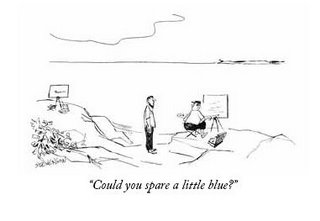 Artist: James Stevenson. Published in The New Yorker June 25, 1960
Artist: James Stevenson. Published in The New Yorker June 25, 1960Swedish dramatist August Strindberg is reported to have said: "Shallow people demand variety – but I have been writing the same story throughout my life, every time trying to cut nearer the aching nerve".
I am using the same blue as his to reach the aching nerve but damn, I have run out of it.
No comments:
Post a Comment